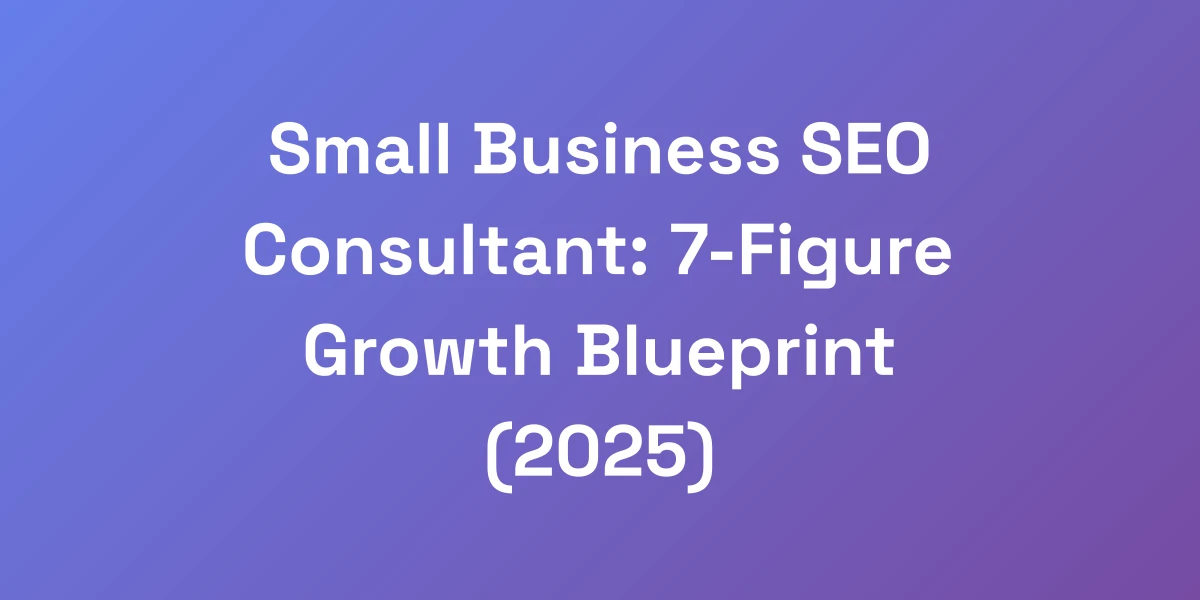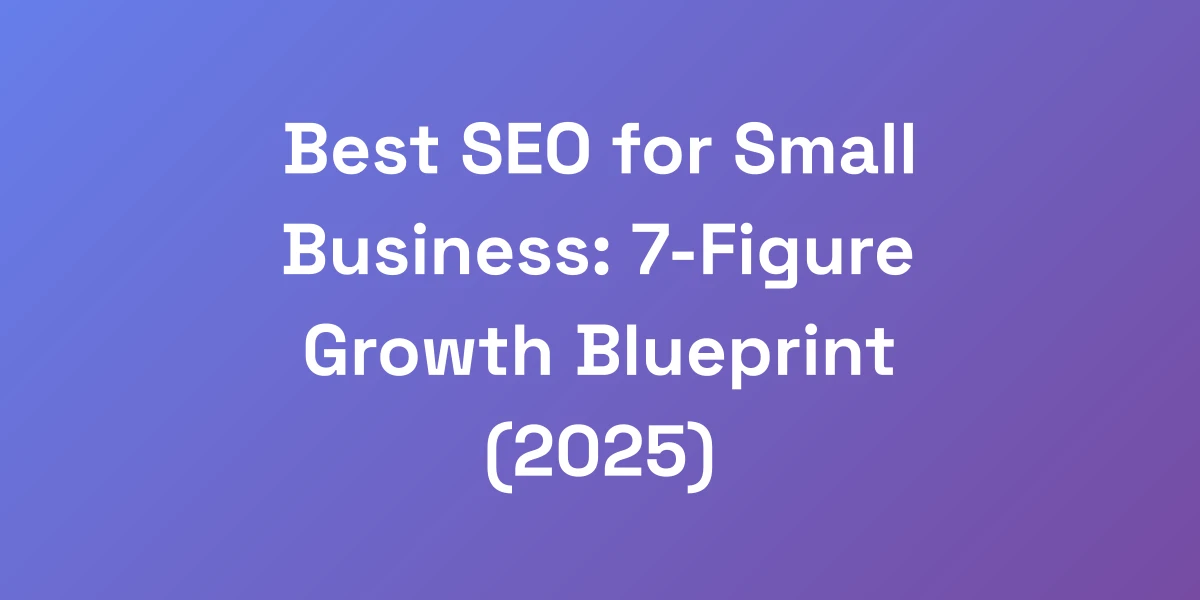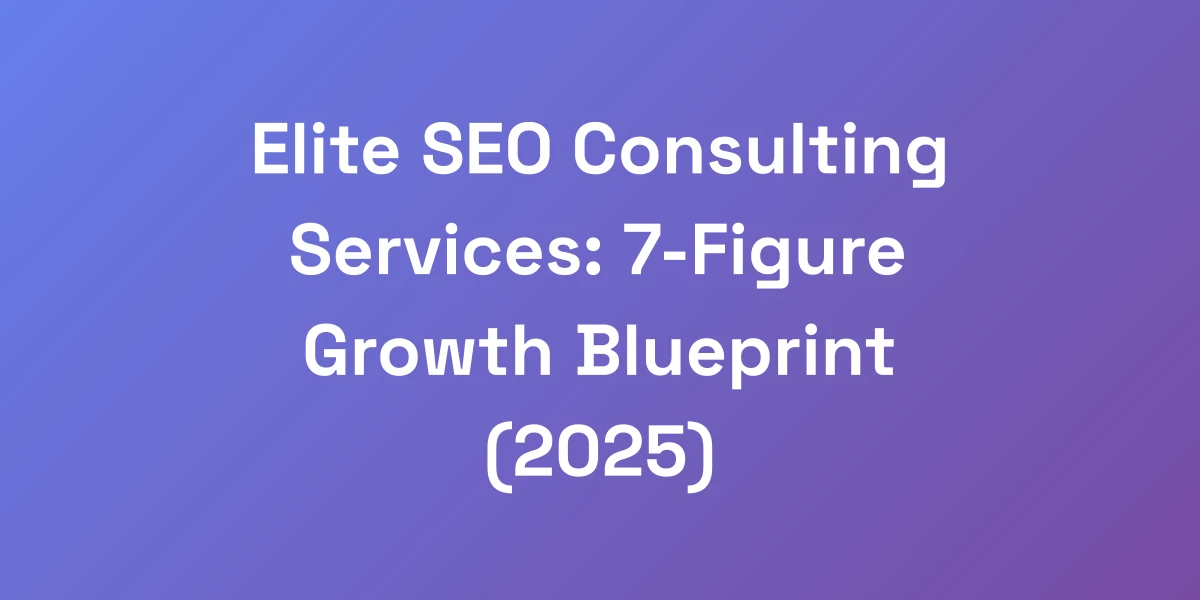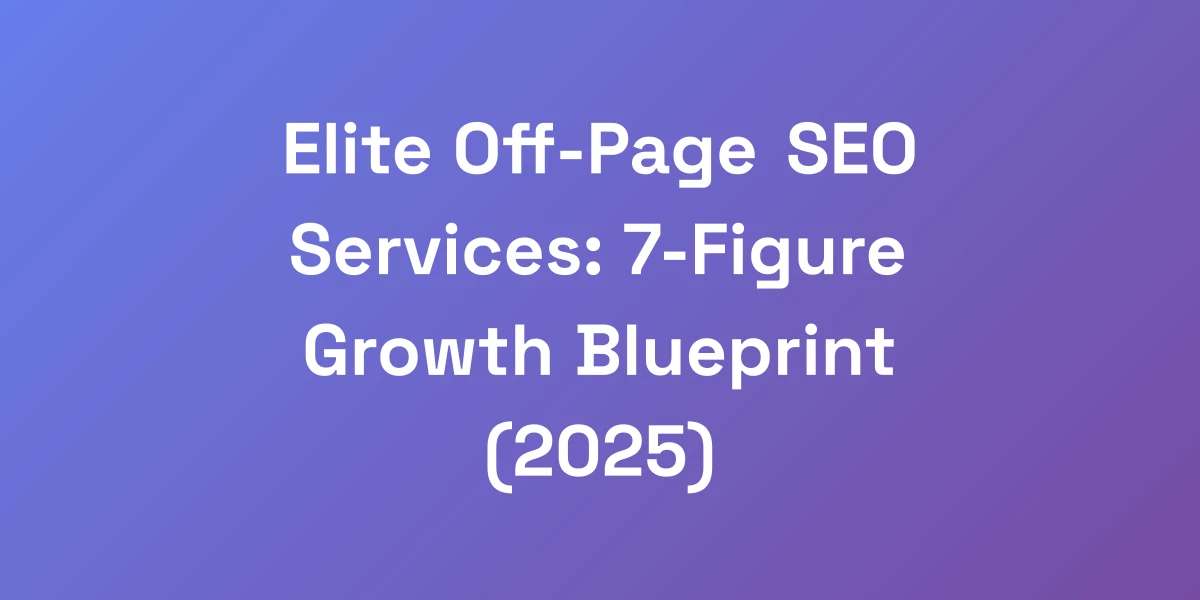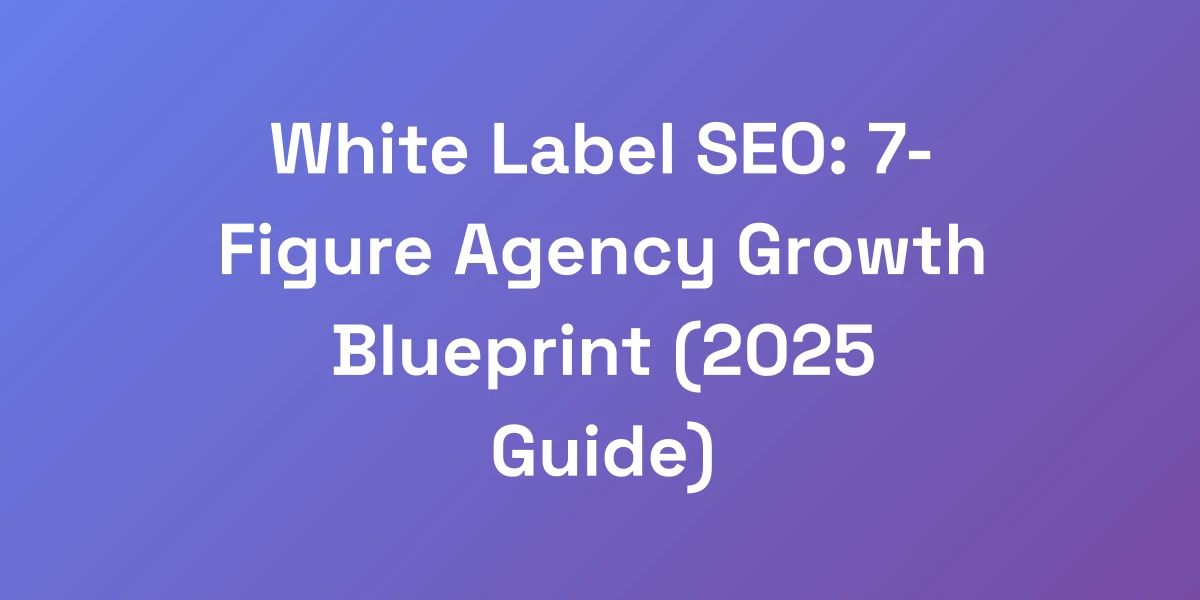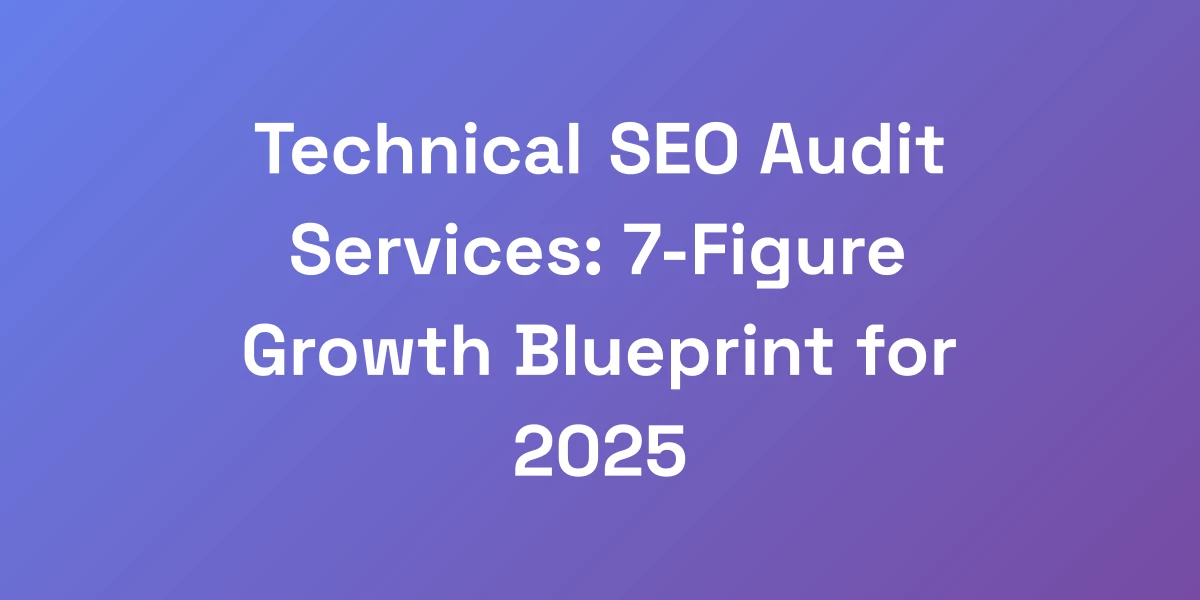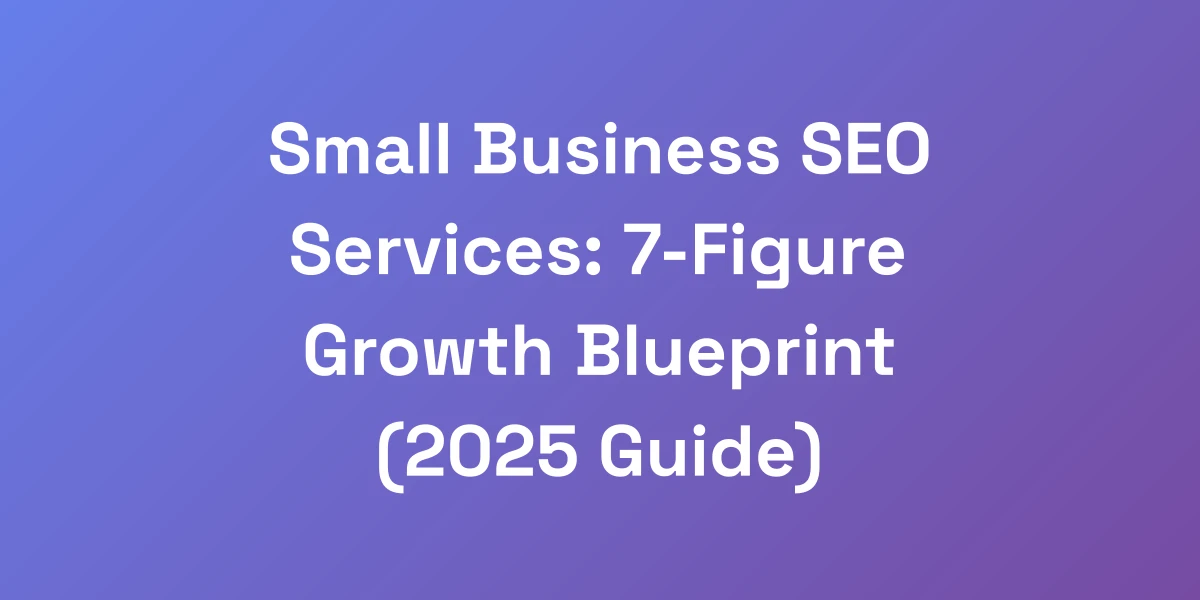
Small Business SEO Services: 7-Figure Growth Blueprint (2025 Guide)
Feb 27, 2025 | By [email protected]
Why Most Small Businesses Fail at SEO (And How to Win)
Let me cut through the BS right now – 90% of small businesses are getting absolutely destroyed in SEO because they’re playing the wrong game.
They’re chasing vanity metrics while their competitors are building money-making machines.
I’ve helped businesses go from zero to $100k/month through SEO, and I’ll tell you this: it’s not about backlinks or keywords – it’s about revenue-focused optimization.
Here’s the truth about what actually moves the needle in small business SEO.
The Real Cost of DIY SEO Mistakes
Tackling SEO on your own might seem like a cost-effective strategy, but the reality is far from it.
Small businesses often underestimate the complexity of SEO, leading to costly mistakes. For instance, only 33% of websites can pass the Core Web Vitals threshold, a crucial metric for user experience and search engine rankings.
Imagine pouring time and resources into optimizing your website, only to find it isn’t even meeting the basic technical criteria required by search engines. That’s a recipe for wasted effort and money.
Common DIY mistakes include poor site structure, slow page speeds, and ignoring mobile optimization. These errors not only hamper your SEO efforts but also deter potential customers.
Instead of facing these pitfalls alone, investing in professional SEO services ensures that your website is built on a solid foundation, avoiding the high costs of rectifying mistakes later.
Why Traditional SEO Agencies Keep You Small
Traditional SEO agencies often promise the world but deliver mediocre results. Why? Because their focus is more on maintaining client dependency rather than driving substantial growth.
These agencies typically adhere to outdated practices, such as keyword stuffing and relying heavily on backlinks, without considering the unique needs of your business.
As a result, your SEO strategy becomes a stagnant asset, failing to adapt to the ever-evolving search engine algorithms and market trends.
Moreover, traditional agencies may not prioritize revenue-focused optimization, leading to efforts that don’t translate into tangible business growth.
To truly scale, you need an SEO partner that’s committed to evolving strategies, focusing on metrics that matter, and driving real revenue growth.
The Revenue-First SEO Framework
What sets successful businesses apart is their approach to SEO. It’s not just about attracting traffic; it’s about driving revenue.
Our Revenue-First SEO Framework centers on optimizing every aspect of your online presence to convert visitors into customers.
This framework includes:
- Strategic Keyword Research: Identifying keywords that align with your revenue goals.
- Content Optimization: Creating content that not only ranks but also engages and converts.
- Technical SEO: Ensuring your website performs optimally to provide a seamless user experience.
- Conversion Rate Optimization: Tweaking your site to maximize conversions from the traffic you receive.
By focusing on these areas, we transform SEO from a mere visibility tool into a potent revenue driver.
Case Study: From $0 to $1.2M Using Strategic SEO
Consider the story of a local e-commerce store struggling to gain traction online.
They approached us with a modest budget and a big dream. We implemented our Revenue-First SEO Framework, starting with a comprehensive technical audit to address Core Web Vitals issues.
Next, we revamped their content strategy, focusing on high-converting keywords and creating engaging, value-driven content.
Within nine months, their website traffic surged by 150%, and revenue skyrocketed from $0 to $1.2 million.
This transformation wasn’t about quick fixes; it was about a strategic, revenue-focused approach that continues to drive growth.
It’s proof that with the right tactics, small businesses can achieve monumental success through SEO.
Essential SEO Services That Actually Drive Revenue
Stop wasting money on useless SEO packages. Here’s what I tell my clients who want to 10x their business: focus on the 20% of SEO services that generate 80% of results.
Your SEO strategy needs to be a profit center, not a cost center. I’m going to show you exactly which services are worth your money and which ones are just draining your bank account.
Let’s talk about the mission-critical services that drive actual customer acquisition.
Local Search Domination Strategy
For small businesses, local SEO is a goldmine. Yet, 58% of businesses still haven’t opted for local SEO.
A Local Search Domination Strategy ensures that your business appears prominently in local search ranking factors, driving targeted traffic to your store.
Here’s how to dominate local search:
- Optimize Google My Business: Maintain an accurate and comprehensive profile with up-to-date information.
- Local Citations: Ensure your business is listed consistently across various online directories.
- Location-Specific Content: Create content tailored to local events, news, and activities to engage the community.
- Customer Reviews: Actively encourage and manage positive reviews to build credibility and trust.
Implementing these strategies increases your visibility among local customers, leading to higher foot traffic and sales.
Content That Converts (Not Just Ranks)
Content is king, but only if it converts. 93% of people read online reviews before making a purchase, and 84% weigh online reviews as much as word-of-mouth recommendations.
Your content strategy should focus on creating value-driven content that addresses customer pain points and encourages action.
Here’s how to create content that converts:
- Identify High-Converting Keywords: Use keywords that your target audience is searching for, related to their intent to purchase.
- Engage with Storytelling: Tell stories that resonate with your audience, making them feel connected to your brand.
- Incorporate Strong CTAs: Guide your readers towards taking actionable steps, whether it’s making a purchase, signing up for a newsletter, or contacting you for more information.
- Use Multimedia: Enhance your content with images, videos, and infographics to keep users engaged and reduce bounce rates.
By focusing on conversion-oriented content, you turn visitors into loyal customers.
Technical SEO for Revenue Generation
Technical SEO is the backbone of a successful website. Only 33% of websites can pass the Core Web Vitals threshold, highlighting the need for a robust technical foundation.
Technical SEO ensures your website is optimized for search engines, providing a seamless user experience that encourages conversions.
Key technical SEO aspects include:
- Site Speed Optimization: Faster websites rank higher and provide a better user experience.
- Mobile Optimization: With the majority of searches conducted on mobile devices, ensuring your site is mobile-friendly is crucial.
- Secure Website (HTTPS): Security is a ranking factor and builds trust with your audience.
- Structured Data: Implementing schema markup helps search engines understand your content better, enhancing visibility in rich snippets.
Addressing these technical elements not only boosts your SEO rankings but also improves the overall user experience, leading to higher conversion rates.
Authority Building That Matters
In the SEO world, authority reigns supreme. Building authority means establishing your business as a trusted and credible source in your industry.
Here’s how to build meaningful authority:
- Earn High-Quality Backlinks: Focus on acquiring backlinks from reputable and relevant websites. As Matt Cutts says, “Link building is not just about quantity but about quality.”
- Guest Blogging: Contribute valuable content to authoritative sites in your niche to gain exposure and authoritative backlinks.
- Thought Leadership: Position your business as an industry leader by sharing insights, conducting webinars, and speaking at events.
- Social Proof: Showcase testimonials, case studies, and positive reviews to build trust and credibility.
Authority building enhances your site’s credibility, making it easier to rank higher in search results and attract more customers.
Conversion Rate Optimization for SEO
Driving traffic is only half the battle; converting that traffic into revenue is where the real magic happens.
Conversion Rate Optimization (CRO) focuses on turning visitors into customers by improving the user experience and removing barriers to conversion.
Effective CRO strategies include:
- A/B Testing: Experiment with different headlines, CTAs, and layouts to see what resonates best with your audience.
- Improve Landing Pages: Ensure your landing pages are focused, clear, and persuasive, guiding users towards desired actions.
- Streamline Navigation: Make it easy for users to find what they’re looking for, reducing friction and improving satisfaction.
- Enhance User Experience: Use clean design, fast load times, and intuitive interfaces to keep users engaged and encourage them to convert.
By optimizing your site for conversions, you maximize the return on your SEO efforts, turning more visitors into paying customers.
How to Choose an SEO Provider That Won’t Waste Your Money
I’ve seen too many small businesses get burned by smooth-talking SEO “experts” who deliver nothing but excuses.
Here’s the brutal truth: most SEO agencies are selling you packages designed to keep you dependent on them.
I’m going to show you how to spot the winners from the losers, and exactly what questions to ask that will make bad agencies run for the hills.
This is your bulletproof selection process.
Red Flags That Scream “Stay Away”
When searching for an SEO provider, certain red flags indicate you should keep looking.
- Guaranteed Rankings: No one can promise top rankings due to the unpredictable nature of search algorithms.
- Secretive Methods: If an agency is vague about their strategies or unwilling to share their processes, it’s a warning sign.
- Overuse of Jargon: Genuine experts communicate clearly, not with excessive industry jargon.
- Too Good to Be True Pricing: Extremely low prices often indicate subpar services or hidden costs.
Avoiding these red flags helps you steer clear of scams and low-quality services, ensuring your investment is protected.
The Only Metrics That Matter
Focus on metrics that directly impact your revenue and business goals.
- Organic Traffic: The number of visitors coming from search engines.
- Conversion Rates: The percentage of visitors who take a desired action, such as making a purchase.
- Return on Investment (ROI): The financial return you’re getting from your SEO investment.
- Keyword Rankings: Positions of your target keywords in search engine results pages.
By prioritizing these metrics, you ensure that your SEO efforts are aligned with your business objectives, driving real growth.
Contract Terms That Protect You
When signing with an SEO agency, the contract should protect your interests.
- Clear Deliverables: Specify exactly what services will be provided and the expected outcomes.
- Performance Clauses: Include terms that hold the agency accountable for their performance.
- Flexible Terms: Avoid long-term contracts that lock you in without the ability to assess performance.
- Termination Clauses: Ensure there are terms that allow you to exit the contract if expectations aren’t met.
A well-structured contract safeguards your investment and ensures the agency remains committed to delivering results.
Questions That Expose Fake Experts
Asking the right questions can help you identify genuine SEO experts from imposters.
- What is your SEO strategy? Genuine experts will provide a clear, tailored strategy rather than generic solutions.
- Can you provide case studies or references? Authentic agencies should have no problem sharing their success stories.
- How do you measure success? They should focus on relevant metrics like ROI, conversions, and organic traffic.
- What tools do you use? Knowledgeable providers will detail the tools and technologies they utilize.
These questions help you gauge the agency’s expertise and ensure they’re the right fit for your business needs.
Success-Based Pricing Models
Choosing an agency with success-based pricing aligns their incentives with your business goals.
Under this model, the agency is compensated based on the results they deliver, such as increased traffic or revenue, rather than just time spent.
This approach ensures that the agency is motivated to achieve tangible outcomes, providing you with a higher ROI.
Success-based models reduce your financial risk and ensure that you’re paying for actual performance rather than promises.
Pricing Guide: What You Should Really Pay for SEO
Let’s talk real numbers. Not the inflated agency prices, not the too-good-to-be-true freelancer rates.
I’m going to break down exactly what quality SEO services should cost in 2025.
Whether you have $500 or $5000 per month, I’ll show you how to allocate every dollar for maximum impact.
This is about getting ROI-focused SEO services that actually grow your business.
Budget Allocation Framework
Allocating your SEO budget effectively is crucial for maximizing returns.
Here’s a framework to guide your budget allocation:
- Technical SEO: 20% – Ensure your website is technically sound, addressing issues like site speed, mobile optimization, and Core Web Vitals.
- Content Creation: 30% – Invest in high-quality, conversion-focused content that resonates with your target audience.
- Local SEO: 15% – Optimize your local presence with strategies like Google My Business and local citations.
- Authority Building: 20% – Focus on acquiring high-quality backlinks and establishing your business as an authority in your niche.
- Conversion Rate Optimization: 15% – Enhance your website’s ability to convert visitors into customers through A/B testing and user experience improvements.
By following this framework, you ensure that every dollar spent on SEO is strategically allocated to areas that drive the most significant results.
Price Ranges for Essential Services
Understanding the cost structure for essential SEO services helps you plan your budget effectively.
- Local SEO: $300 – $5,000 per month, depending on the scope and scale of services required.
- Content Creation: $1,000 – $3,000 per month, based on the volume and quality of content needed.
- Technical SEO: $500 – $5,000 per month, influenced by website complexity and required optimizations.
- Authority Building: $1,000 – $4,000 per month, varying with the quality and number of backlinks being targeted.
- Conversion Rate Optimization: $500 – $2,000 per month, depending on the extent of testing and user experience improvements.
These price ranges provide a clear picture of what to expect when investing in quality SEO services, ensuring you get the best value for your money.
ROI Calculator for SEO Investment
Calculating the ROI of your SEO investment is essential to measure its effectiveness.
Here’s a simple way to estimate your SEO ROI:
- Determine Your Revenue from SEO: Track the sales and leads generated through organic search.
- Calculate Your SEO Costs: Include all expenses related to SEO services, tools, and resources.
- Use the ROI Formula:
ROI = [(Revenue from SEO – SEO Costs) / SEO Costs] x 100
For example, if you spend $2,000 on SEO and generate $12,000 in revenue from organic search, your ROI would be:
[(12,000 – 2,000) / 2,000] x 100 = 500%
This calculation demonstrates that investing in SEO can yield substantial returns, making it a worthwhile endeavor for small businesses.
Hidden Costs to Watch For
While planning your SEO budget, be aware of potential hidden costs that can impact your overall investment.
- Content Revisions: Unlimited revisions can lead to escalating costs. Ensure your contract specifies a reasonable number of revisions.
- Additional Services: Some agencies may charge extra for services like PPC management or advanced analytics.
- Tools and Software: Premium SEO tools may not be included in the agency’s fees, adding to your expenses.
- Unexpected Campaign Adjustments: Changes in strategy based on algorithm updates or market shifts can incur additional costs.
Being mindful of these hidden costs helps you manage your budget more effectively, ensuring your SEO investment remains profitable.
Scaling Your SEO Budget
As your business grows, so should your SEO budget. Scaling your SEO investment can amplify your results and drive further growth.
Here’s how to scale your SEO budget effectively:
- Assess Performance: Regularly review your SEO metrics to identify what’s working and where to allocate more resources.
- Expand Services: As your budget increases, invest in additional SEO services like international SEO, advanced content marketing, and comprehensive technical audits.
- Increase Content Production: More content means more opportunities to rank for different keywords and engage with a broader audience.
- Enhance Authority Building: Invest in acquiring high-quality backlinks and establishing stronger authority in your niche.
By scaling your SEO budget in alignment with your business growth, you ensure continuous improvement and sustained success.
Implementation Timeline: Your First 90 Days
Most small businesses fail at SEO because they don’t have a clear roadmap.
Here’s your day-by-day battle plan for the first 90 days.
This is the exact timeline I use with clients who want rapid results.
We’re talking about specific actions, deliverables, and milestones that show you’re on track for success. No fluff, just pure execution strategy.
Month 1: Foundation Building
The first month is all about laying a solid foundation for your SEO strategy.
- Technical SEO Audit: Conduct a comprehensive audit to identify and fix technical issues like broken links, site speed, and mobile optimization.
- Keyword Research: Identify high-converting keywords that align with your business goals.
- Competitor Analysis: Analyze your competitors’ SEO strategies to identify opportunities and gaps.
- Google My Business Setup: Optimize your Google My Business profile to improve local search visibility.
- Content Audit: Review existing content to identify areas for improvement and gaps that need filling.
By the end of the first month, your website should be technically sound and primed for effective SEO strategies.
Month 2: Growth Acceleration
With the foundation in place, the second month focuses on accelerating growth through targeted strategies.
- Content Creation: Develop high-quality, conversion-focused content targeting identified keywords.
- Local SEO Optimization: Implement local SEO strategies, including building local citations and encouraging reviews.
- On-Page Optimization: Optimize existing pages for better keyword targeting and user engagement.
- Authority Building: Start acquiring high-quality backlinks through guest blogging and outreach.
- Conversion Rate Optimization: Begin testing on-site elements to improve conversion rates.
This month is about driving traffic and starting to see initial results from your SEO efforts.
Month 3: Optimization & Scaling
The third month is about refining your strategies and scaling your efforts for continued growth.
- Performance Review: Analyze SEO metrics to identify what’s working and what needs adjustment.
- Advanced Content Strategies: Expand your content strategy to include more in-depth articles, multimedia, and interactive content.
- Enhance Technical SEO: Address any remaining technical issues and optimize for the latest Core Web Vitals.
- Authority Expansion: Increase efforts in acquiring high-quality backlinks and establishing thought leadership.
- Scale CRO Efforts: Implement more advanced CRO techniques based on initial testing results.
By the end of the 90 days, your SEO strategy should be fully optimized and set for scalable growth.
Key Performance Indicators
Tracking the right KPIs is essential to measure the success of your SEO efforts.
- Organic Traffic: Monitor the increase in visitors from search engines.
- Keyword Rankings: Track the positions of your target keywords in search results.
- Conversion Rates: Measure the percentage of visitors who take desired actions on your site.
- Revenue from SEO: Assess the direct financial impact of your SEO efforts.
- Backlink Quality: Evaluate the quality and relevance of acquired backlinks.
These KPIs provide a clear picture of your SEO performance and guide ongoing optimization efforts.
Common Roadblocks and Solutions
Even with a solid plan, roadblocks can arise during your SEO journey.
- Algorithm Changes: Stay updated with Google’s algorithm updates and adjust your strategies accordingly.
- Resource Limitations: Delegate tasks or consider outsourcing to manage resource constraints effectively.
- Content Fatigue: Keep your content fresh and engaging by regularly updating and diversifying your content types.
- Low Conversion Rates: Continuously test and refine your CRO strategies to improve conversion rates.
- Competitive Market: Differentiate your SEO strategy by focusing on unique value propositions and niche targeting.
Anticipating these challenges and having strategies in place helps you navigate the complexities of SEO, ensuring sustained growth and success.
Conclusion
SEO isn’t just a buzzword; it’s a powerful tool that can transform your small business into a revenue-generating machine.
By understanding the common pitfalls, investing in the right services, choosing the right partners, and following a strategic implementation plan, you set your business on a path to seven-figure growth.
Remember, it’s not about quick fixes or chasing irrelevant metrics—it’s about a sustained, revenue-focused approach that aligns with your business goals.
Ready to take your business to the next level with proven SEO strategies? Contact us today to start your journey towards unparalleled growth.
What’s your biggest SEO challenge right now? Share your thoughts in the comments below!
